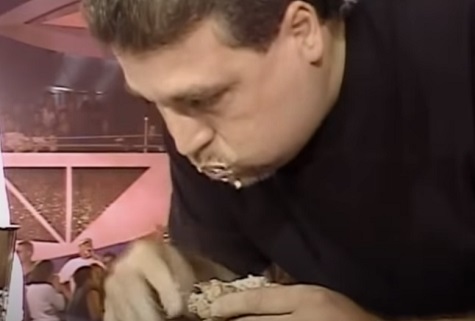“Spectacle has, indeed, an emotional attraction of its own, but, of all the parts [of performance], it is the least artistic, and connected least with the art of poetry.”
— Aristotle
There does not seem to be any poetry in a dozen men eating 60 gallons of cow brains in six minutes, let’s get that out of the way now. But is there not fear and pity? Fear for their health, pity for their colons? And if not awe, a kind of astonishment that you are watching this happen on your TV on a random Thursday? A spectacle is not uncanny but it is something beyond expected entertainment. You can’t look away, because what if you miss something? What will you tell people later?
I watched The Glutton Bowl when it aired in February 2002 and I have been talking about it ever since. Two hours of not just competitive eating, but tournament competitive eating — contestants facing off over various foodstuffs to win their way to the final. Two hours! But maybe you need that time when you have so many things to cram into your mouth — hamburgers, sushi, hot dogs, hard-boiled eggs.
Or sticks of butter. In a very fuzzy YouTube video, we see a group of men housing these fatty bricks. “A certain amount of butter remains on the face…it is up to the judge to look at smearage,” an announcer intones. The video has been uploaded by Don “Moses” Lerman, who as events show is the winner of this event. Lerman is a former matzah-ball-eating champion and, per the announcers, “has very strong jaws and quick hands.” It is probably for the best that the video quality is so poor as Lerman shoves these greasy logs down his gullet, undeterred by the butter coating his beard. He has a “sustained quickness to his movements…Watch how Lerman gnaws that butter like a squirrel,” an announcer says. He puts down seven (seven!) sticks in a few minutes to win. “I would not say he coasted, but he did win a decisive victory today in butter.”
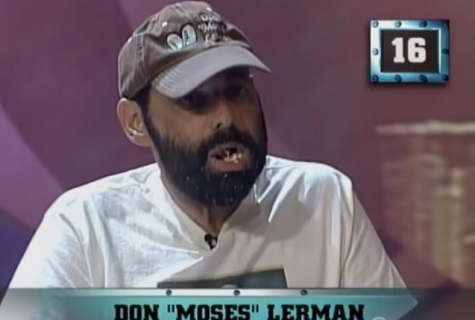
Perhaps we should meet these announcers. Mark Thompson has apparently won Emmys and narrated Guinness World Records: Primetime and When Good Pets Go Bad. He has one of those voices that creates its own echo, a Joe Buck-ian baritone that is surprisingly versatile — it can declaim and ask questions in the same register and it provides a baseline of acceptance for what we see here even as it is astonished at the feats on display. If this guy is announcing it, it must be legit. George Shea, the co-founder of the International Federation of Competitive Eating, is his partner, the color man, the guy who is both more excitable but also more knowledgeable about the human factors at play here. His voice is higher but contains an authority of its own — Thompson can describe the scene, but Shea is the guy who has probably met George “Garbage Guts” Glum, a large man who works with deaf people and who is about to eat as much mayonnaise as he possibly can.
This event too has been preserved on YouTube and it’s the one — well, aside from the finale — that has stuck with me all these years. I am one of those mayonnaise haters to begin with, but I can’t imagine any fan actually eating one straight spoonful, let alone dozens, without puking. And yet that is the challenge before half a dozen men here — The Glutton Bowl introduces each challenge by lowering a 60-gallon drum from the rafters of its stage and spilling the foodstuff to be eaten all over a giant bowl, Spectacle as a thick, white, allegedly edible waterfall. (The food dumped out of the barrel is not the food the contestants actually eat, at least.) “Mayonnaise is going to be a lot more difficult than people think — remember, it’s not a food, it’s a sauce,” Shea cautions. “Competitors are going to have to spoon it very quickly, but they’re also going to have to suck it. They cannot let themselves try to chew.” The countdown begins: 3! 2! 1! EAT!
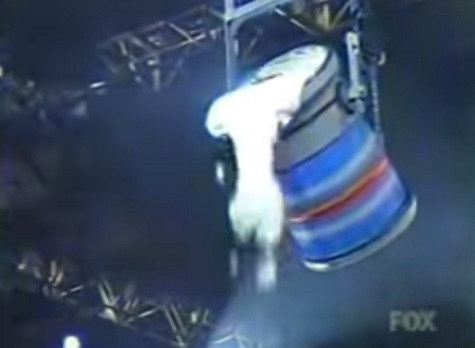
The reality TV show is concerned with drama. Not in the poetic sense but the contemporary conception of conflict concealed and revealed among actors for the benefit of an audience,not (in theory — ed.) created by an outside author but by the actors’ real interaction. It is about choices people make, and at the dawn of the millenium, reality TV was drunk on choices. Who will be voted off the island? Who will be the next American Idol? Will the current dumbshit on Who Wants To Be A Millionaire pick the right answer? In many ways, sports are the original reality TV, in the sense that real people are acting without a script for a viewer’s entertainment, but sports are about whether the participants’ choices are successful (is the pass caught, is the ball hit, is the shot made?) as opposed to hemming and hawing over the choices themselves. The story of sports broadcasting is the story of varying attempts to integrate action on the field with off-field drama, which reaches its nadir every four years with the hideous Olympic coverage of family tragedies and obstacles overcome. But on the other hand, action needs context to be more than physics. Picture, if you will, a group of men hunched over 32-ounce bowls of mayonnaise, spooning it into their mouths and swallowing it down as fast as they possibly can. It is gross and compelling for a moment, bodies doing something they absolutely should not be doing. This is freakishness but not spectacle. Where is the emotion?
“Cookie Jarvis is no stranger to mayonnaise: he actually ate mayonnaise out of the jar as a child,” Shea tells us as Jarvis plows through spoonfuls of white goo. The Glutton Bowl shows the names and basic physical stats of its competitors but otherwise gives almost no backstory, and that’s good. But what Shea and Thompson understand at a — ahem — gut level is that gluttony itself is not enough to captivate. They work their asses off on coverage: in the mayonnaise clip (another video that benefits from not being able to see too clearly just what is happening) they appear to be following the lead of the show’s director from shot to shot and their ability to roll with this would be impressive in any sport, seamlessly weaving insider information into the existing action. “Cookie has tried this…he said it produces a mayonnaise catatonia,” Shea says. “These guys are going to have horrible aftereffects.”
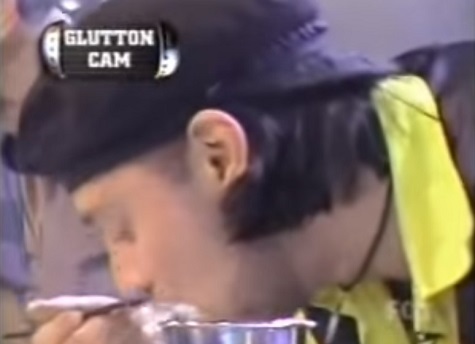
But they are able to react to new developments, where the drama of reality is at its finest, and here, that is the dawning of “the mayonnaise-consuming juggernaut that is Oleg Zhornitsky!” Zhornitsky, a young man wearing a French’s Mustard-colored shirt with a black vest and black Kangol, is “using the spoon God gave him” to just shovel the mayo into his face. “You’d think he would inhale the mayonnaise!” Thompson marvels. The announcers cover the other competitors — “a gutty performance by all these athletes,” Shea acknowledges — they are fair, but they also know an underdog and crowd favorite when they see one and keep returning to Zhornitsky. How could they not? “He looks like a hungry child with unlimited amounts of free pudding!” Shea exclaims.
What Zhornitsky actually looks like is a man on his way to eating eight fucking pounds of mayonnaise. But Shea and Thompson and the rest of the Glutton Bowl crew understand how to make this something larger and marginally less repulsive than it is. Zhornitsky competes in an arena with exposed beams and bright lights of early-aughts reality TV. He is shown in close-up on the GLUTTON CAM, the crowd is small, but their cheers are loud — this is cheap but committed-to. As shown on TV, Zhornitsky is a champion from out of nowhere, the Great White-Stuff-Eating Hope. But his victory here is not the end of the show. He and Lerman and all the winners of the previous contests will face off in the final event, eating something TBD. “Coming up is a food so shocking, you won’t believe your eyes,” Thompson teases.
I can honestly say that as I watched that giant drum spill over for the championship event back in 2002, I did not expect a bunch of cow brains to come out. But I didn’t disbelieve it either. I was watching something called The Glutton Bowl, on FOX, for fuck’s sake. There was a certain assumption of tackiness here, an expectation that the spectacle would lower itself to the occasion. What makes The Glutton Bowl stand out in my mind is how proud it is to be so gauche. The emotional attraction of watching something without any shame. “Type of Brain: Cow” reads the information graphic. “Buckets of brains! Not a pretty sight! Now, George, some consider them to be a delicacy…before everyone freaks out, in many cultures they’re a delicacy, others consider them to be disgusting,” Thompson intones, echoing, unconsciously I hope, Fred Willard’s immortal work on Best In Show. Even Thompson has trouble delivering “The person who’s eaten the most brains by the end of the time will be The Glutton Bowl Champion!” though — the contestants may have to swallow brains; here Thompson is swallowing laughter at the absurdity of it all. But he recovers as the platters of cow cerebella— 10 pounds each, with additional five-pound plates at the ready — are unveiled and the devouring commences. “What was an unconventional night up til now becomes downright bizarre!”
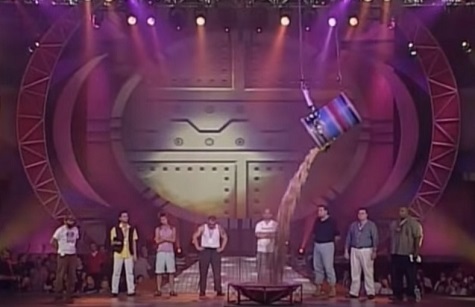
And here, we see Aristotle for the punk bitch that he is. Because the legendary Takeru Kobayashi, the hot-dog-eating champion, immediately runs away with the contest, and for the next six minutes, Thompson and Shea must contend with a complete lack of drama in the spectacle of a line of doughy men desperately picking wet gray flesh chunks to gnaw on and gulp down. How do they manage to recognize the unholy consumption of Kobayashi and honor the valor of his opponents? Through poetry:
Shea: “Kobayashi eating in delicate fashion, he seems to have complete control over these brains…look at Kobayashi with the swoop! He swoops it into his mouth, right down into his stomach.”
Thompson: “None of these competitors seem the least bit daunted by the prospect of eating brains!”
Shea: “Oleg may have met his match! He fought down a mighty, mighty sway upward, ladies and gentlemen, I think he needed that burp, he got it, he’s back at the plate.”
Shea, on another competitor: “The Doginator seems to have met his match in a ten-pound plate of cow brains…the Doginator, his head dropped not in shame, but clearly he’s struggling with the brain.”
Thompson: “How is it possible that Kobayashi, the man slightest in stature, is so far out ahead?”
Shea: “The prince! The tsunami! The king of competitive eating!”
“Look at the dance! That is physical poetry!” Shea exclaims as Kobayashi unleashes a shimmy while taking precise bites of brain, the Elvis of eating. One poet recognizing another, and bowing to the superior artist. “He is the greatest athlete in the world, there is no question about that in my mind.”
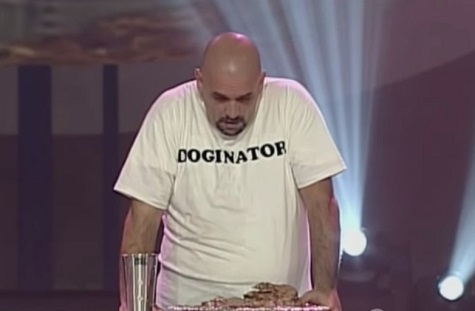
In the final minute, Kobayashi finishes not just the original platter but an additional plate. The crowd goes nuts as one more pile of brains is brought out. He finishes with a preposterous 53 brains, we are told — the same infographic that identified the “Brains” as “Cow” also said each brain weighs roughly 1/3 of a pound, meaning Kobayashi apparently ate 17 pounds of cow brains in six minutes. For this he gets a moderately-sized trophy as confetti cannons go off all around him. “We have just witnessed an incredible spectacle in this world of competitive eating,” an awestruck Thompson announces.
This final act of The Glutton Bowl is also online and in much crisper video than the previously-described segments, all the better to see Kobayashi’s devastating, sharklike attack, to see Oleg’s valiant attempts to keep up, to see the Doginator’s rictus of indigestion and despair. I’m glad it’s there, and yet also selfishly glad much of the Glutton Bowl appears to be lost. It gives me something to pass on, a spectacle to relate to those who did not see and yet will now hear (perhaps at a party when I have had a few beers) and have their mind’s eyes opened to the wonder and terror of what a human stomach can achieve. In awe of the performances, inspired by the poetry, I sing of brains and the man.

